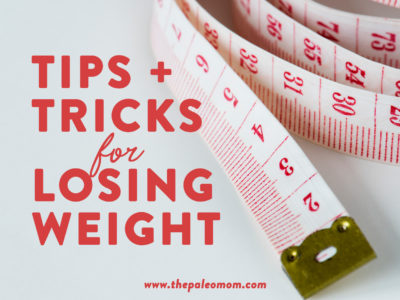Clinical trials confirm that the Paleo diet can reverse metabolic syndrome, improve cardiovascular disease risk factors, mitigate diabetes and support healthy weight loss (see Paleo Diet Clinical Trials and Studies). But if your weight-loss seems stalled or too slow, there are some extra tricks that will help you lose weight faster and/or get beyond those natural plateau points that our bodies all seem to have.
1. Don’t Eat for 3-4 Hours Before Bed: When you eat shortly before bed, you increase your metabolism and suppresses growth hormone release, which makes it very difficult to lose weight. Bonus, avoiding eating right before bed improves sleep quality!
2. Get Lots (and Lots and Lots!) Of Sleep: Getting plenty of sleep will help regulate your cortisol levels and give your body plenty of time to rest and repair. See The Link Between Sleep and Your Weight. If you are prioritizing sleep but still not sleeping well, check out Go To Bed.
3. Manage Stress: Do whatever you can to keep your stress level in check. This is about the stress hormone cortisol, which profoundly affects the ease at which our bodies access stored energy, how we metabolize fat versus sugar, our insulin sensitivity and our leptin (hunger hormone) sensitivity. See How Stress Undermines Health.
Save 80% Off the Foundations of Health
Expand your health knowledge on a wide range of topics relevant to you, from how to evaluate scientific studies, to therapeutic diet and lifestyle, to leaky gut and gut microbiome health, to sustainable weight loss, and much more!!!

4. Get Lots of Low-Strain Exercise: Things like walking, yoga, and swimming are fabulous for regulating your hormones and reducing stress (exercise is not about burning calories, it’s about regulating hormones). They also build muscle tone without stressing your body. Some light resistance training (yoga, pilates, lifting weights without going nuts) can be very helpful as well. One of the key points here is that “over-training”, by which I mean doing something that is too stressful for your body, ends up increasing cortisol and derailing your weight loss efforts. See The Benefits of Gentle Movement and Why Exercising Too Much Hurts Your Gut.
5. Get Outside: Our bodies need sunlight. Sun exposure helps regulate our circadian rhythms and our adrenal glands (via the hypothalamus and pituitary gland), which affects cortisol regulation, as well as a whole host of other hormones. If getting outside just isn’t possible for you, make sure you are taking a Vitamin D3 supplement (I recommend somewhere in the 2000-10,000 I.U. daily range).
6. Eat 2-3 Meals per Day (and maybe one snack): Eating less frequently is better for your insulin and leptin sensitivity (and actually all of your hormones). If you are also keeping your sugar intake fairly low, then this is really great for regulating your hunger too. Some people like to create a calorie deficit by occasionally skipping meals. This only works if your stress levels (specifically your cortisol levels) are well-managed (you should be getting plenty of sleep and lots of low-strain exercise).
7. Portion Control: I know, I know. No one likes to measure their food or count their calories. Unfortunately, creating an energy deficit is the most important key to losing weight. See New Scientific Study: Calories Matter. Scientific studies show that when people adopt the Paleo diet, they tend to spontaneously decrease caloric intake, meaning we get full faster from all those nutrient-dense whole foods that we’re eating so we don’t eat as much. Where this tends to fail is when we’re tired or stressed (hence tips 2, 3 and 5) or when we have a history of disordered eating, like binge-eating disorder. If you’re not sure whether or not you’re overeating, keep a food journal for a few days to track your total energy intake. Look to consume about 10% fewer calories than you need to maintain your weight each day.
8. Increase Carbohydrates: Isn’t low-carb the secret to losing weight? Well, it can work well for a short period of time, but as a long-term approach, it has some stark limitations; see How Many Carbohydrates Should You Eat?. Insulin is actually required for the conversion of the thyroid prohormone T4 to the active hormone T3. Since thyroid hormone controls metabolism, increasing your carbohydrate intake a little to support thyroid function can actually help boost weight loss. Other things that are good for supporting your thyroid are managing stress, getting enough sleep, and eating lots of seafood (for the iodine and the selenium). Adequate carbohydrate intake can also help regulate cortisol, muscle recovery after working out, and protect insulin and leptin sensitivity.
9. Eat Enough Food. Under eating slows down our basal metabolic weight, meaning we’re constantly chasing lower and lower caloric intake in order to maintain weight loss. And in fact, under eating can have such a severe effect on our basal metabolic rates that it can take years to recover. This is one of the key contributors to that rapid weight gain and yo-yo effect after we go on short-term weight-loss diets. We need a moderate caloric deficit, say about 10% of our total caloric needs, to lose weight over safely and over the long-term. Larger caloric shortfalls can mess around with hormones like insulin and leptin as well as thyroid function.
10. Focus on Nutrient-Density:
If you find yourself battling cravings or your body just doesn’t seem to be responding to your weight loss efforts (keeping in mind all of the tips above), a nutrient deficiency may be at the root of the problem. Shortages in B-vitamins for example can have a huge effect on our metabolism. Deficiencies in magnesium and calcium can cause sugar cravings. And vitamin D deficiency is linked to much higher risk of obesity. See The Importance of Nutrient Density and 3 Ways to Up Your Nutrient Game.
11. Promote Healthy Digestion: If you feel that you are stuck at a weight-loss plateau, first evaluate your health. Do you really need to lose more weight? Maybe it’s time to turn your focus to fitness goals and creating lifelong habits for maintaining a healthy weight. If you do still feel like you need to lose more weight, you might be dealing with micronutrient deficiencies or something like small intestinal bacterial overgrowth. See my post on Repairing the Gut for ways to address this. You might also consider focusing on more highly nutrient-dense foods, like organ meat, seafood and eating more vegetables. Adding digestive support supplements can also be very helpful. Once your gut health is improved, the weight should start coming off again.
12. Patience: As I mentioned above, it’s possible that you are already at a great weight for your body, even if it isn’t what you were hoping to achieve. How do you feel? Are you energetic? fit? happy? If you do still have weight to lose and you are doing everything else right, it might just be that your body needs some time to adjust hormone levels (but also check out my post on Female Hormones, Weight and Autoimmunity), adjust the number of receptors on cell surfaces, and repair itself. When your body is ready (and this might take one to three months), you will start losing weight again.









